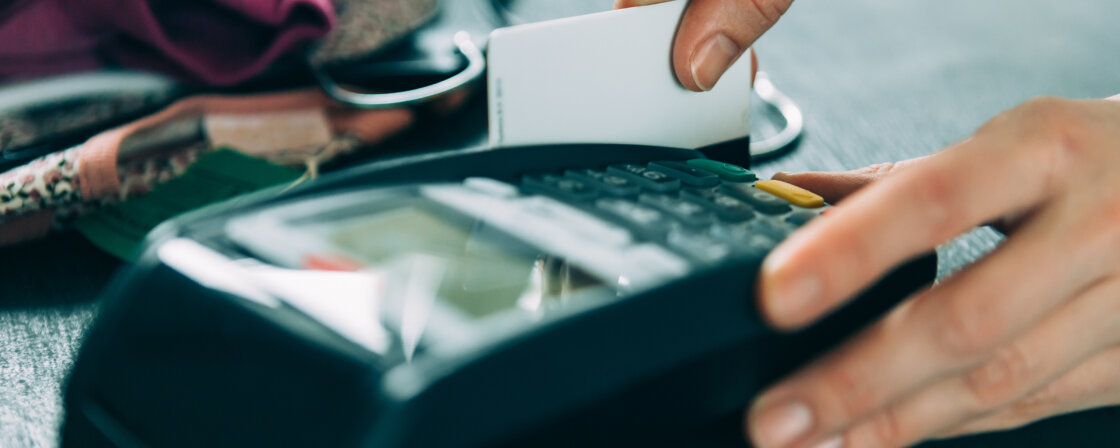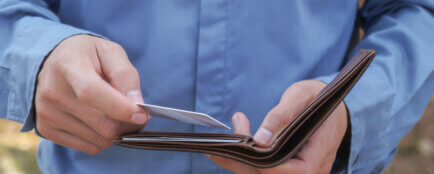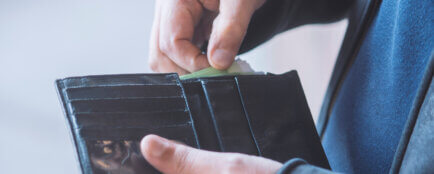How and when can a credit card be misused?
Misuse of a payment card means unauthorised use of the card or its data to carry out transactions without the knowledge and consent of the cardholder. This can take many forms, from physical misuse of the card to sophisticated cyber-attacks.
Physical misuse can easily occur, for example, when a wallet or card is stolen . The perpetrator can then use the card to make payments in shops, withdraw cash from ATMs, or even make purchases on the internet if they have access to the card details.
Phishing is another common way in which unauthorised card use occurs. It is a fraudulent technique in which victims are persuaded through various strategies to volunteer their sensitive data. The perpetrators often send emails or SMS messages that look like official communications from a bank or other trusted institution, and require the entry of card details on a fake website.
Tip for article
Tip: The internet is a world full of opportunities, entertainment and information. In our next article, we look at the dangers that lurk on the internet, look at the most common types of scams and give you advice on how to behave online to avoid these dangers.
Are you solving a similar problem?
Have you been a victim or witness to a crime, are you considering filing a criminal complaint?
We will advise you on how to proceed. We will protect your rights quickly, efficiently and profitably.
I want to consult
- When you order, you know what you will get and how much it will cost.
- We handle everything online or in person at one of our 6 offices.
- We handle 8 out of 10 requests within 2 working days.
- We have specialists for every field of law.
Cyber attacks are more sophisticated methods where hackers attack merchants’ or payment service providers’ databases and obtain card details in bulk. This information can then be used for unauthorised transactions or sold on the black market.
All these forms of card misuse can have serious financial consequences for the victim.
How can I protect myself from credit card fraud?
Start by always carrying your card in a safe place and not leaving it unattended. It’s also important to regularly check your account statements and watch for suspicious transactions that could indicate misuse. You can also set up various alerts and, most importantly, limits for using your card in e-banking.
When shopping online, it’s key to only shop on verified and secure sites. Always check that the web address starts with “https://” and that there is a lock symbol next to it, indicating a secure connection. Never share card details via email, text or phone call and use two-factor authentication where possible.
Tip for article
Tip: Ignore “bargain” email offers to buy suspiciously cheap or unavailable items. Buying fake Viagra, “branded” speakers or handbags has been proven to be a scam many times. The link usually leads to a suspicious website whose operators misuse the credit card details after the purchase of an unrealistically cheap product.
When using ATMs, avoid those that look suspicious or are located in remote areas. Before inserting your card, check that the ATM is not equipped with a fraudulent device, such as a skimmer, which could copy your card details. In general, if there is any unusual device installed on the ATM, do not entrust your card to it.
As mentioned above, other useful measures include setting limits on payments and withdrawals, using virtual cards for online payments, and last but not least, blocking your card immediately if it is lost or suspected of being misused. By following these simple rules, you can significantly reduce the risk of misuse of your payment card. For example, if you keep your weekly limit set at 20,000 CZK (or less), you can prevent the biggest excesses, such as “embezzling” your entire account.
What to do if you become a victim of card misuse?
If you discover an unauthorised transaction on your account, it is important to act as quickly as possible. The first step should be to immediately block your credit card. This can usually be done through your bank’s mobile app, online banking or by calling the bank’s customer service line. The contact information for blocking your card is sometimes listed on the back of the card, but it’s a good idea to keep it somewhere else so you can access it if you lose your card.
Once your card has been blocked, you must inform the bank of the unauthorised transaction. The bank will usually ask you for details of the transaction so that it can start an investigation. It is also important to confirm in writing as soon as possible that you did not authorise the transaction, which may include completing a claim form.
The next step is to report the card misuse to the police, especially if there has been significant financial damage. The police will need details of the transaction and may request copies of communications with the bank. A report from the police may also be useful when dealing further with the bank or insurance company.
Communicate with the bank regularly throughout the process and monitor the status of the investigation. It is important to keep all documents and communications that can be used as evidence in any litigation or criminal proceedings.
Legal aspects and criminal liability for credit card misuse
Misuse of a credit card is a serious offence that can fall under more than one offence under the Criminal Code. A typical offence related to the misuse of a payment card is Unauthorised use, forgery and alteration of a means of payment – this includes both the use of another’s payment card(Whoever, without the consent of the authorised user, procures, makes available, accepts or possesses a means of payment which enables the withdrawal of cash…) and the forgery of a payment card – for example through the aforementioned skimming(Whoever procures, makes available, accepts or possesses a forged or altered means of payment…). The Criminal Code defines the different variants of this offence according to their severity, with the risk of up to 12 years’ imprisonment in the case of forgery and participation in an organised group or the commission of a large-scale offence. If the perpetrator “only” uses someone else’s payment card, he or she faces a maximum of two years’ imprisonment.
The Criminal Code also distinguishes between offences related to counterfeiting money (counterfeiting and alteration of money, uttering counterfeit and altered money, or the production and possession of counterfeiting tools and equipment intended for the unauthorised acquisition of a means of payment). The last-mentioned offence is again aimed at the counterfeiting of payment cards.
Stories from practice
In practice, there are a number of cases where victims of payment card fraud have succeeded in legal disputes and obtained compensation. Even if your bank initially refuses to help you in any way, it pays to be patient and insist on your rights (especially if you are innocent; no one will reimburse you for the loss on a card borrowed by your underage son to buy computer games).
For example, we saw a story in the media of a woman who discovered that her credit card had been misused to make purchases abroad, even though she herself was not physically travelling anywhere at the time. She immediately contacted her bank and reported the unauthorised transactions. The bank initially denied the claim, claiming that the transactions had been carried out correctly. However, the woman did not give up and pursued the case through the Financial Arbitrator. He eventually ruled in her favour and the bank had to refund all the unauthorised transactions.
Another well-known case involves a businessman who discovered unauthorised withdrawals from a company account. After discovering that the cards had been misused by skimming, a technology that copies data from the card’s magnetic stripe, he immediately contacted the bank and the police. Again, the bank initially denied the claim and the businessman went to court. The court proceedings revealed inadequate security at the ATM, which led to a ruling in favor of the businessman and an order for the return of all lost funds.
From law practice:
From time to time, victims of similar crimes turn to the law firm Available Advocate. At one time, victims received convincing and urgent phone calls that someone was currently withdrawing a large sum of money from their account. In a panic, they then disclosed their valuable card details and subsequently the misuse actually occurred. Know, however, that banks know your card details and don’t want to verify them via email or phone call. Only some of the criminal charges have gone in favor of the victims. This has happened in situations where there were multiple victims and some of the calls were even recorded, giving the police a lot of evidence.
The future of payment card security
Payment card security is constantly evolving to face increasingly sophisticated threats. Modern technology and the legal framework play a key role in protecting consumers and ensuring a safe environment for financial transactions.
One of the most significant technological innovations that is already enhancing payment card security is the introduction of EMV chip cards (Europay, Mastercard, Visa). These cards generate a unique code for each transaction, thereby significantly reducing the risk of data misuse. Further expansion of biometric authentication methods, such as fingerprint, facial or iris recognition, is expected in the future, which may provide an even higher level of security.




